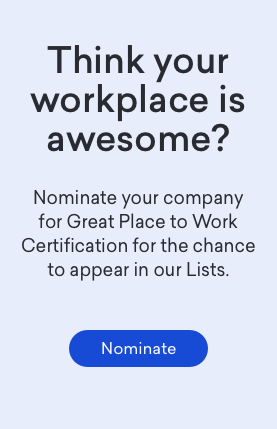W. L. Gore and General Mills Have What it Takes
Eight manufacturing organizations are on the 2015 Fortune 100 Best Companies to Work For® list. Great Place to Work® Institute uncovered three strategies that these organizations use to overcome manufacturing industry challenges. Namely, culture, communication, and fair pay practices help these manufacturing companies provide a consistently positive employee experience across locations and job roles
Key Stats
Top Manufacturing Workplaces
8 manufacturing organizations are on the 2015 Fortune 100 Best Companies List. Averages among these organizations include:
- 5% Voluntary employee turnover
- 58 Training hours for full-time hourly employees
- 63 Applicants per job opening
APQC has had the opportunity to study human capital management (HCM) best practices at two of the manufacturing companies on the 2015 100 Best Companies to Work For® list. Our case study-based research on W. L. Gore & Associates and General Mills provides examples of the three success factors identified by Great Place to Work®.
1. Connect Employees Via Shared Culture, Values, & Purpose
W. L. Gore's mission is to create and nurture a culture that engages all associates so they can deliver innovative products and great business results. Gore has articulated its culture in four fundamental beliefs: belief in the individual, power of small teams, all in the same boat, and long-term view. Read more about Gore's culture and shared beliefs in Reviving Leadership Capabilities: W. L. Gore Case Study.
General Mills has five values that Tim Gluszak, currently manager, learning and development, global diversity & inclusion at General Mills, indicated to APQC are success factors for retaining talent:
- We build our great brands.
- We strive for consistently superior performance.
- We do the right thing all the time.
- We innovate in every aspect of our business.
- We respect, develop, and invest in people.
Each year, General Mills conducts a global climate survey to measure progress in working in accordance with these values. The results are dissected and action plans developed to address any issues that have emerged. Various manager programs have been developed in direct response to the climate survey results.
2. Communicate Regularly with All Employees Regardless of Location or Shift
Mary Tilley, HR leader at W. L. Gore, shared with APQC that the organization strongly values direct one-to-one communication among associates. There are no barriers to accessing other associates, including the CEO. Associates are expected to share knowledge and information. They conduct work by networking, sharing, and collaborating.
Similarly, General Mills has many avenues to communicate with employees and for employees to communicate with each other. An internal Facebook-style network allows all employees across the globe to: look up and contact each other, enter information about themselves and their areas of expertise, and form their own communities around technical or outside interests. The organization also has an expert locator system through which employees ask and respond to each other's technical questions.
Employee affinity groups provide connection opportunities for General Mills employees who identify with a range of diverse populations. Groups include the Hispanic Network, the Black Champions Network, and Betty's Family, which brings together lesbian, gay, bisexual, and transgender employees. Each group stages a one-day or multi-day development event, which includes a range of workshops and interactions with executives. In addition, General Mills has an internal learning academy that facilitates knowledge transfer among employees by planning job rotations, project assignments, and formal training opportunities.
3. Establish Equity Through Fair and Transparent Pay and Profit Sharing
In addition to being shaped by four fundamental beliefs, Gore's culture is also defined by four guiding principles: fairness, freedom, commitments, and waterline. Fairness guides all Gore associates to treat coworkers, customers, and vendors fairly. However, fairness does not mean that all associates are treated equally. W. L. Gore's assessment and rewards process illustrates the fairness principle as well as Gore's commitment to transparency regarding how decisions are made. At Gore, rewards are focused on an associate's work contributions. The performance assessment process begins with all associates in a unit providing feedback and relative rankings for the contributions of their peers. These relative contribution rankings are the basis for compensation decisions. To be rewarded, associates must deliver business results and do so in accordance with the organization's foundational beliefs and core principles.
General Mills also adheres to a pay for performance philosophy, offering base pay, incentives, and stock rewards based on individual employee and/or company performance. In addition, General Mills has an Individual Development Plan process that puts employees in the driver's seat of their careers but with the support of their managers and HR. Read more about how General Mills rewards and retains employees in the following two APQC resources: Retention and Work/Life Balance Programs at General Mills--April 2012 HCM Community Call and Technical Talent Management - General Mills Case Study.
See the full list of manufacturing organizations on the 2015 Fortune 100 Best Companies to Work For® list below. Read more industry insights about the top workplaces in the Great Place to Work® analysis: "Industry-Specific Strategies of Winning Companies." And, check out these manufacturing industry resources from APQC:
- APQC's Manufacturing Tune-Up Diagnostic
- Key Manufacturing Benchmarks at a Glance
- Optimize Training Hours for Better Manufacturing Performance
- Getting from Push to Pull: Making Knowledge Flow in Merck's Manufacturing Division
- Latest Manufacturing Process Improvement Techniques: Silfex Case Study
- Latest Manufacturing Process Improvement Techniques: IEC Electronics Case Study
Share your thoughts on top workplace practices for manufacturing organizations. Leave a comment on APQC's blog, send me a tweet at @ElissaTucker, or drop an email to This email address is being protected from spambots. You need JavaScript enabled to view it..
2015 Fortune 100 Best Companies to Work For® List: Manufacturing Companies
- Arthrex
- Devon Energy
- General Mills
- Hilcorp
- JM Family Enterprises
- Mars, Incorporated
- Stryker Corporation
- W.L. Gore & Associates
ABOUT ELISSA TUCKER
Elissa Tucker is a research program manager at APQC. She is responsible for developing and executing APQC's human capital management research agenda. Elissa has written and been featured in many HR industry publications and is a regular speaker for HR industry webinars and conferences. Elissa has more than 15 years of HR research, writing, and advising experience. Prior to joining APQC, Elissa worked as a senior research consultant at, Hewitt Associates (now AonHewitt). Elissa co-edited and contributed to the book: Workforce Wake-Up Call: Your Workforce Is Changing, Are You?, John Wiley & Sons, 2006.
ABOUT APQC
APQC is a member-based nonprofit and one of the leading proponents of benchmarking and best practice business research. Working with more than 500 organizations worldwide in all industries, APQC focuses on providing organizations with the information they need to work smarter, faster, and with confidence. Every day we uncover the processes and practices that push organizations from good to great. Visit us at www.apqc.org and learn how you can make best practices your practices.












